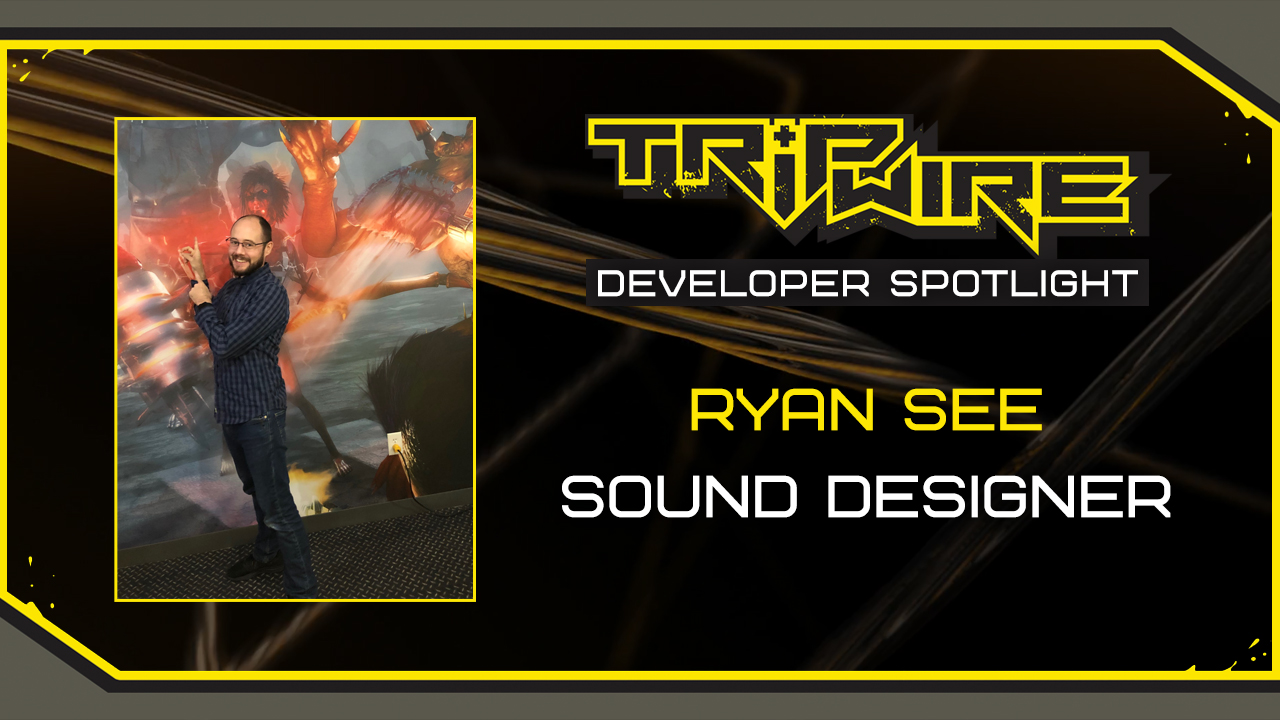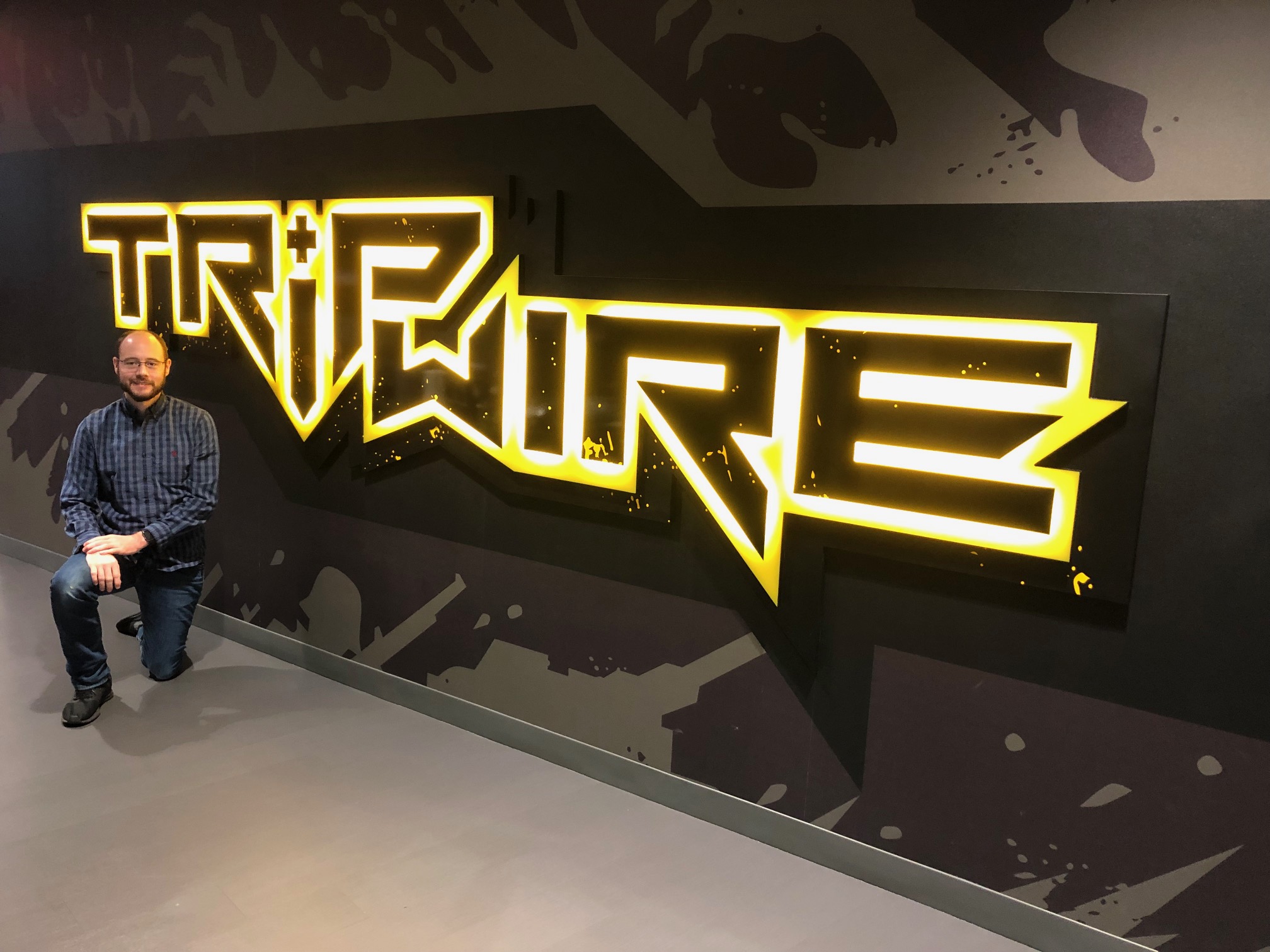
For starters, can you provide a brief synopsis of who you are and what your role is with Killing Floor 2?
My name is Ryan See and I am a sound designer here at Tripwire. I am responsible for creating and implementing the sounds for KF2.
How long have you been employed at Tripwire?
I'll be at three years this October. Time has flown by!
Take us through a typical day of work at Tripwire for you, what is it like when you show up at the office?
I typically get into the office at around 8:45am. I start out by checking my bugs and making a plan for the day. After this, I dive into my tasks which typically revolve around creating sounds for various elements of the game. I have about 1 or 2 meetings a day that I attend and the rest of my time is spent designing weapon and ambient sounds for KF2.
How did you get started in the Games Industry?
I started out in the game industry as an Audio Artist Intern at EA Tiburon. I worked on the Madden and NCAA Football franchises there. I was lucky enough to have landed the audio internship at EA right out of college. I stayed at EA for a few years before transitioning to Tripwire.
What accomplishment are you most proud of while working in the Games Industry?
There are many accomplishments that I am proud of in the game industry. However, I am more thankful than proud to be a part of the game industry. I am thankful that I have been able to make a living in this industry and thankful that I have a loving and supporting wife who sticks by me and supports me in my endeavors. I am also thankful to Tripwire for providing me with a job where I can be creative and do what I love.
What hobbies do you enjoy outside the workplace?
Believe it or not...I play a lot of video games when I am at home. Other than that, I enjoy long walks with my dogs, hanging out with my wife, and building DIY audio gear. Nothing too exciting.
There is a lot of content to create sounds for in Killing Floor 2 such as ambient sfx, weapon sfx, Zed sfx etc. Which area do you particularly enjoy creating sounds for and why?
There are a lot of sounds in the game. I have a really fun time creating ambient and weapon sounds. However, I would have to say my favorite is when we do any Zed reskins and they require VO and SFX work. It is a lot of work...but I find it very fun and rewarding.
What is your all-time favorite video game and why?
Pokemon Gold and Silver takes the prize for me. Anytime I have a chance to play a Pokemon game I do. They bring out the little kid in me and allow me to just forget about the world. A notable second is GTA V...I still play online with my friends on a weekly basis.
Could you provide a bit of detail as to the process of creating sounds for a weapon and Zed from beginning to end?
Of course! For a weapon I generally start with looking at the feature set of the weapon. I look at if it is a single shot, full auto, or melee weapon. I then go through all the animations and watch how it functions. This helps me solidify what source audio I will need to pull and create. If the weapon is a real world weapon, I try to pull references for the actual weapon and incorporate some elements or flavor of it into the game version. I then start designing the shoot sounds and the weapon handling sounds. The handling sounds usually consist of reload and gun movement sounds. Once the sounds are created, I implement them into the game, test, and iterate.
The process for creating Zeds is a little more complex. First, I look at the designs of the Zed and meet with the writers to determine the inspiration behind them. This helps me to form a direction for the sound design. Zed sounds are broken up into two different categories. We have the VO of the Zeds and then we have the sound effects. For the VO, I break the audio up into a few more categories. We have exertions, screams, pain, breaths, taunts, deaths, and death taunts. There are a few more...but you get the point. Once the script is locked in, we select a voice actor and record the lines. After the lines have been recorded, I then have to edit and organize them based on the category. Next is the fun part. Once the lines have been chopped up and organized, I start manipulating the audio to sound more "Zed" like. This is typically done by utilizing different pitch, flanger, phasing, and sample replacement plugins. I also use some layering techniques to add flavor. I won't bore you with the details. Once I land on the desired sound I am looking for, I apply it to all the audio files and start the process of getting the VO files into the game. I then test and make changes where needed.
The process is similar for Zed sound effects. These sounds are typically broken up into categories such as impacts, gore, attacks, and footsteps. Same as before, I start out by looking at the Zed design and start pulling source audio that fits the sound palette I am aiming for. Since each Zed is unique, I try to make it so each one sticks out to the player in a unique way. Once I've chosen the sounds to build the Zed out of...I capture some videos for the Zed and start designing sounds to match the visuals. Most of my time is spent in Pro Tools creating the sounds. Similar to the other processes, I import the sounds into Wwise and start implementing them into the game engine. I then test and iterate until they are functioning the way I intended.
What audio software do you use? Any particular reason(s) you use this software over others?
I mainly use Pro Tools and Wwise. Pro Tools is a go-to DAW for many audio engineers. I've been working in it for so long that it has become my main DAW that I work in. The editing functionality offered by it are in my opinion top notch and provide for a quick and fluid workflow compared to other DAW's. However, everyone functions and learns differently...so there are multiple software options out there to use. I also use Wwise as my audio middleware tool. Wwise is a great tool for game audio folk. The profiling element alone is a good enough reason to use it.
Could you give us a glimpse of what you're currently working on now in Killing Floor 2?
Certainly! I am currently working on a new map and some new weapons. There also may be a few objective related tasks in my task list.
What advice might you have for those interested in pursuing an audio career at a game studio?
Don't give up and always be creating something. Get your audio portfolio up on the internet and start putting yourself out there. Social media is a great way to gain exposure. Reaching out to other game audio professionals and building your network is also a must. In addition, always continue to educate yourself. There are so many great free tools and tutorials out there to help you grow and learn. If you want to get into the industry...strive to always be creating and learning new things. This industry is always evolving and expanding...so, having a creative and hungry mindset will benefit you greatly.
Any last parting words of wisdom?
Always continue to educate yourself. It's also good to remember that you may not always achieve the desired results on your first go around...but the journey you take that result will always yield useful lessons. If you are someone that is in the industry already...consider mentoring somebody. Not only can you learn a lot from mentoring and teaching others...but you can develop and grow from the experience as well. Thank you for letting me share with you!

Last edited:

